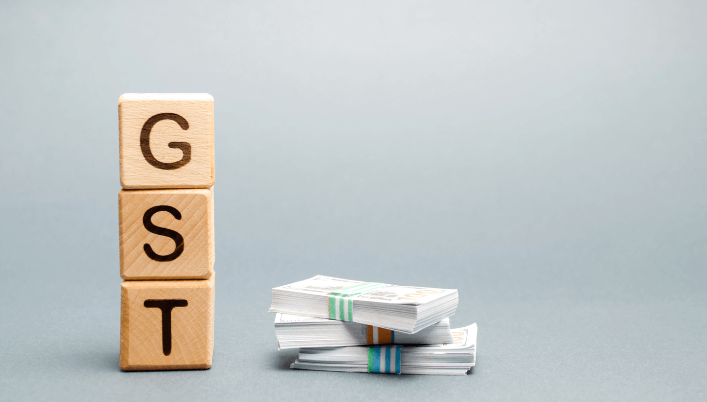GST in Singapore

GST Rates
| Year | GST Rate |
|---|---|
| 1 Apr 1994 to 31 Dec 2002 | 3% |
| 1 Jan 2003 to 31 Dec 2003 | 4% |
| 1 Jan 2004 to 30 Jun 2007 | 5% |
| 1 Jan 2023 to 31 Dec 2023 | 7% |
| 1 Jan 2023 to 31 Dec 2023 | 8% |
| 1 Jan 2024 onwards | 9% |
What is GST?
GST in Singapore is a consumption tax imposed on the supply of goods and services in Singapore.
It was introduced by the Singapore government in 1994 to diversify the country’s sources of revenue and reduce reliance on direct taxes.
GST is levied on most goods and services imported into Singapore, as well as supplies made within Singapore.
GST is a broad-based tax that applies to a wide range of goods and services, including groceries, electronics, services like haircuts and legal advice, and more.
However, some items are exempt from GST, such as financial services, residential properties, and the sale or rental of most used residential properties.
GST, or Goods and Services Tax, was introduced in Singapore in 1994 as a value-added tax.
It is a tax on domestic consumption, and the responsibility to charge and account for GST lies with businesses that are registered for GST.
The GST payable is based on the value of goods and services provided in Singapore, including imports.
However, certain international services are zero-rated, which means that GST is not charged on them.
While businesses can claim the GST incurred on their purchases as input tax, individuals cannot claim the GST paid on their personal expenses.
This tax system complements Singapore’s income tax rate, which is relatively low.
The Comptroller of GST collects the GST and ensures that businesses comply with the regulations.
The recent announcement that GST will be increased in Singapore has sparked discussions about its impact on individuals and businesses.
However, the implementation of the GST increase will be delayed until 2023, providing time for individuals and businesses to adjust.
The specific details of the GST hike, such as the new tax rates, have yet to be announced.
It is important to note that, as an indirect tax, GST is charged and collected by businesses at various stages of the supply chain.
Businesses must pay the net GST to the tax authorities after deducting the input GST they have paid.
This ensures that GST is ultimately paid by the end consumer.
In addition to goods and services, GST now applies to imported digital services as well.
This expansion aims to ensure that similar services, regardless of their origin, are subject to equal taxation.
Overall, the GST system in Singapore plays a crucial role in the country’s tax policy.
It is a common and widely accepted form of tax globally, and Singapore’s GST system aligns with international standards.
The introduction of GST has streamlined the tax system and provided a stable revenue stream for the government.
What is the GST rate in Singapore?
The current GST rate in Singapore is 7%.
This is considered the standard rate and applies to most goods and services.
However, there are certain goods and services that have a lower GST rate of 0% or are exempt from GST altogether.
It’s important to note that the Singapore government reviews the GST rate periodically to ensure it remains appropriate for the country’s economic needs and revenue requirements.
Any changes to the GST rate are announced by the government well in advance and implemented with sufficient lead time for businesses and individuals to adjust.
Who is required to register for GST in Singapore?
In Singapore, businesses with an annual taxable turnover of more than SGD 1 million are required to register for GST.
This is known as compulsory registration.
However, businesses with a turnover below this threshold can still choose to voluntarily register for GST.
Certain businesses, such as residential properties or businesses engaged in the sale of exempt or zero-rated supplies, are exempt from GST registration.
Additionally, some businesses may be eligible for exemption from registration if they meet specific criteria.
http://www.youtube.com/watch?v=ieHfnzV1zSI
It’s important for businesses to be aware of their obligations and ensure that they comply with the GST regulations set by the Inland Revenue Authority of Singapore (IRAS).
They should also keep track of any changes to the GST rate or other GST-related policies to ensure accurate reporting and compliance.
Key Takeaways
- What is GST?
GST is a consumption tax in Singapore that applies to most goods and services, introduced in 1994 to diversify revenue sources. - GST Rate
The standard GST rate is 7%, but certain goods and services have lower rates or are exempt. Rate changes are periodically reviewed and announced. - GST Registration
Businesses with an annual taxable turnover exceeding SGD 1 million must register for GST, while voluntary registration is available for smaller businesses. Some businesses are exempt based on specific criteria. - GST Benefits
GST registration offers benefits like claiming input tax credits, enhancing credibility, and professionalism. The recent GST rate increase will be delayed to allow businesses to adjust. - Filing GST Returns
Businesses must track GST collected and paid, complete and submit GST F5 return forms. Filing frequency depends on annual taxable turnover, with deadlines one month after the accounting period. - Paying GST
Businesses need to pay the net GST amount (output tax minus input tax) to IRAS after filing returns, with various payment methods available. Compliance with filing and payment requirements is crucial to avoid penalties. - Input Tax and Output Tax
Input tax refers to GST paid on business purchases, while output tax is collected on sales. Calculations are based on the GST-inclusive price, and managing both taxes effectively ensures compliance. - GST Compliance
Businesses should avoid common GST mistakes related to goods, services, imports, GST numbers, collected GST, and compliance. Non-compliance can lead to penalties and audits. - GST Audits
GST audits are conducted based on risk assessment factors and involve reviewing records, interviews, sample testing, and inspections. Cooperation with auditors is essential. - Penalties for Non-Compliance
Non-compliance can result in penalties, fines, and even imprisonment. Penalties vary based on the extent of non-compliance and can be severe for deliberate or fraudulent activities. Late filing and late payment also incur penalties.
GST Registration Procedure in Singapore

Are you a business owner in Singapore?
If so, you may have heard of GST and the benefits it can offer your company.
But what exactly is GST, and how can you register for it?
In this article, we will delve into the world of GST registration in Singapore.
How to register for GST in Singapore
Registering for GST in Singapore is a straightforward process.
To register, you must meet certain criteria set by the Inland Revenue Authority of Singapore (IRAS).
The registration process can be done online on the IRAS website.
By registering for GST, your business becomes GST-registered and is known as an “output tax” collector.
GST registration procedure and requirements
The GST registration procedure requires you to provide information about your business and its activities.
You will need to provide details such as your business registration number, financial year-end, and estimated taxable turnover.
It is essential to note that businesses with a taxable turnover exceeding SGD 1 million within the past 12 months must register for GST.
If you are unsure about the process, you can seek assistance from a corporate service provider.
Benefits of GST registration for businesses in Singapore
Registering for GST offers several benefits for businesses in Singapore.
Firstly, being GST-registered allows you to claim input tax credits, which can help reduce the overall cost of your business operations.
This benefit is particularly significant for businesses that make substantial taxable purchases.
Additionally, GST-registered companies are seen as more credible and professional, which can enhance their reputation among customers and business partners.
By registering for GST, you also become liable for GST payments.
However, this liability can be offset by claiming input tax credits, leaving you with minimal additional costs.
It is important to note that the recently announced increase in GST will be delayed until further notice, providing businesses with additional time to adjust to the new rate.
http://www.youtube.com/watch?v=n-s4V7kOX3w
In conclusion, understanding and registering for GST in Singapore can bring significant advantages to your business.
By following the registration process and meeting the necessary requirements, you can enjoy the benefits of GST while enhancing your business’s credibility and reputation.
GST Filing and Payment in Singapore: File GST Returns

How to file GST returns in Singapore
When it comes to filing GST returns in Singapore, there are a few key steps to follow.
First, businesses need to keep track of the GST they have collected and paid on their purchases and sales.
This information should be recorded in their accounting records.
Next, businesses must complete and submit the GST F5 return form.
This form requires businesses to provide details on the GST collected, GST paid, and any adjustments or amendments to previous returns.
The GST F5 return form can be submitted online through the Inland Revenue Authority of Singapore (IRAS) website.
When to file GST returns in Singapore
The filing frequency for GST returns in Singapore depends on the annual taxable turnover of the business.
If the annual taxable turnover exceeds SGD 1 million, businesses are required to file GST returns on a quarterly basis.
If the annual taxable turnover is SGD 1 million or below, businesses can choose to file GST returns either on a quarterly or biannually basis.
The deadline for filing GST returns in Singapore is one month after the end of the accounting period.
For quarterly filing businesses, the deadline is the last day of the month following the end of the quarter.
For biannually filing businesses, the deadline is the last day of the month following the end of the 6-month period.
How to pay GST in Singapore
Once the GST returns are filed, businesses are required to pay the net GST amount to the IRAS.
The net GST amount is calculated by subtracting the GST input tax (GST paid on purchases) from the GST output tax (GST collected on sales).
Payment can be made through various methods such as bank transfer, credit card, or check.
It is important for GST-registered businesses in Singapore to understand and comply with the GST filing and payment requirements to avoid any penalties or fines.
By staying on top of their GST responsibilities, businesses can ensure smooth operations and maintain compliance with the tax regulations.
GST Input Tax and Output Tax in Singapore: Pay GST Tax

What is GST input tax?
In Singapore, businesses are required to charge Goods and Services Tax (GST) on their sales, known as output tax.
At the same time, they can also claim the GST incurred on their business purchases, known as input tax.
Input tax is the GST paid on goods and services purchased for business use.
When businesses file their GST return, they need to report both the output tax collected and the input tax claimed.
The input tax credits can be deducted from the output tax.
If the input tax is greater than the output tax, businesses can claim a refund from the tax authorities.
What is the GST output tax?
GST output tax refers to the GST collected on the sales of goods and services.
Businesses are required to charge GST on their taxable supplies.
The output tax is then remitted to the tax authorities during the GST filing.
How to calculate GST input tax and output tax
To calculate the GST input tax and output tax, businesses need to understand the GST-inclusive price.
The GST-inclusive price is the total price of a product or service, including the GST.
For input tax, businesses can claim the GST incurred on business purchases.
This includes any additional GST expenses.
The total GST incurred on purchases can be claimed as input tax.
For output tax, businesses need to charge GST on their sales based on the GST-inclusive price.
The amount of GST collected is the output tax.
By understanding and keeping track of the input tax and output tax, businesses can manage their GST obligations effectively and ensure compliance with the tax regulations in Singapore.
GST Compliance and Enforcement in Singapore

Common GST mistakes to avoid in Singapore
When it comes to Goods and Services Tax (GST) compliance in Singapore, it’s important for businesses to be aware of common mistakes and avoid them.
Some key areas to focus on include:
- Goods or services: Understand which goods or services are subject to GST and ensure you are charging the correct rate.
- Exempt from GST: Be aware of goods or services that are exempt from GST and ensure you don’t charge GST on them.
- Imports of goods: Familiarize yourself with the rules and regulations regarding GST on imported goods to avoid errors in reporting.
- GST number: Ensure that your business has a valid GST registration number and that it is properly displayed on invoices and other relevant documents.
- GST collected: Accurately account for and report the GST collected from customers to avoid discrepancies.
- GST costs: Claim input tax credits for GST paid on business expenses to reduce your overall GST liability.
- Non-compliance with GST regulations: Stay updated on changes to GST regulations and ensure your business is compliant to avoid penalties and legal issues.
GST audits and investigations in Singapore
To ensure compliance with GST regulations, Singapore companies may undergo GST audits and investigations by the tax authorities.
These processes are carried out to verify the accuracy of GST reporting and identify any potential discrepancies.
Some important points to note about GST audits include:
- Businesses are selected for audits based on risk assessment factors such as the size and complexity of their operations.
- During an audit, the tax authorities may review business records, invoices, financial statements, and any other relevant documents.
- Procedures for GST audits include interviews with key personnel, sample testing of transactions, and conducting on-site inspections.
- It’s important to cooperate fully with the auditors and provide all requested information and documentation.
Penalties for GST non-compliance in Singapore
Non-compliance with GST regulations in Singapore can result in penalties and fines.
The severity of the penalties depends on the nature and extent of the non-compliance.
Some key points to be aware of include:
- Additional penalties may be imposed if there is deliberate non-compliance or fraudulent activity.
- The maximum penalty for non-compliance is a fine of up to three times the amount of the tax undercharged or incorrectly refunded, and/or imprisonment.
- The tax authorities may also impose penalties for late filing of GST returns, late payment of GST, or failure to register for GST when required.
To ensure GST compliance and avoid penalties, businesses should stay updated on GST regulations, maintain accurate records, and seek professional advice when needed.
Conclusion
GST in Singapore Conclusion
In conclusion, the Goods and Services Tax (GST) in Singapore is a crucial aspect of the country’s economy.
It affects numerous areas such as international services, selling prices, Singapore Customs, GST refunds, prospective and retrospective bases, warehouses, and more.
The implementation of GST has had a significant impact on Singaporean households and overseas customers.
It has provided a steady flow of revenue for businesses and has helped to standardize the taxation process for various supplies and services.
The recent GST rate increase has generated mixed reactions, especially among lower-income households and businesses.
However, the government has implemented measures such as the Tourist Refund Scheme and zero-GST warehouses to mitigate the impact on certain sectors.
To comply with GST regulations, businesses need to be aware of their registration requirements and liability.
They must file GST tax returns accurately and on time, accounting for inputs and outputs taxes.
It is important for businesses to keep abreast of changes in GST rates, accounting cycles, and registration limits.
The Singapore tax department conducts inspections and interviews with business representatives to ensure compliance.
Non-compliance can result in penalties and outstanding tax obligations.
Thus, it is crucial for businesses to understand and adhere to the administrative requirements associated with GST.
Overall, Singapore’s GST system plays a pivotal role in the country’s economic growth and major export activities.
It ensures that both businesses and individuals contribute to the nation’s revenue while providing essential services and products.
The government continually reviews and updates the GST system to strike a balance between economic development, ease of doing business, and the welfare of citizens.
Frequently Asked Questions
What is GST in Singapore?
GST stands for Goods and Services Tax.
It is a tax imposed on the supply of all goods and services in Singapore, except for exempt supplies.
What is the GST rate in Singapore?
Currently, the prevailing GST rate in Singapore is 7%.
However, it is important to note that the government has announced plans to increase the GST rate to 9% sometime in the future.
Who needs to register for GST in Singapore?
Businesses that have an annual turnover of more than SGD 1 million are required to register for GST in Singapore.
However, voluntary registration is also allowed for businesses that have a turnover of less than SGD 1 million.
What is the procedure for GST registration?
The procedure for GST registration in Singapore involves submitting an application to the Inland Revenue Authority of Singapore (IRAS) along with the required documents such as business registration information, financial statements, and particulars of shareholders and directors.
What is a GST return and how often do I need to file it?
A GST return is a form that businesses use to report their GST transactions to the IRAS.
Businesses registered for GST in Singapore are required to file their GST return on a quarterly basis, within one month after the end of each accounting period.
How do I charge GST to my customers?
As a GST-registered business, you are required to charge GST on your taxable supplies.
The GST amount should be clearly indicated on your invoices and receipts.
What does it mean to be GST registered?
Being GST registered means that your business is officially recognized by the IRAS as a supplier of taxable goods and services.
It allows you to charge and collect GST from your customers, as well as claim input tax incurred on your purchases.
Are both goods and services subjected to GST in Singapore?
Yes, both goods and services are subjected to GST in Singapore.
The supply of goods and services is considered taxable unless they fall under the exempt supplies or zero-rated supplies categories.
Can I claim input tax on goods or services that I have purchased?
Yes, as a GST registered business, you can claim input tax on goods or services that you have purchased for the purpose of your business.
However, there are certain conditions and restrictions on what can be claimed as input tax.
What happens if I fail to pay or file my GST returns?
If you fail to pay or file your GST returns on time, you may be liable to penalties and fines imposed by the IRAS.
It is important to ensure timely and accurate filing and payment of your GST obligations to avoid any penalties.












